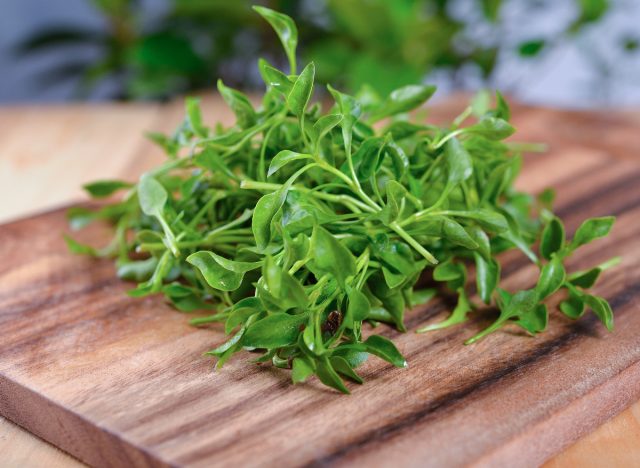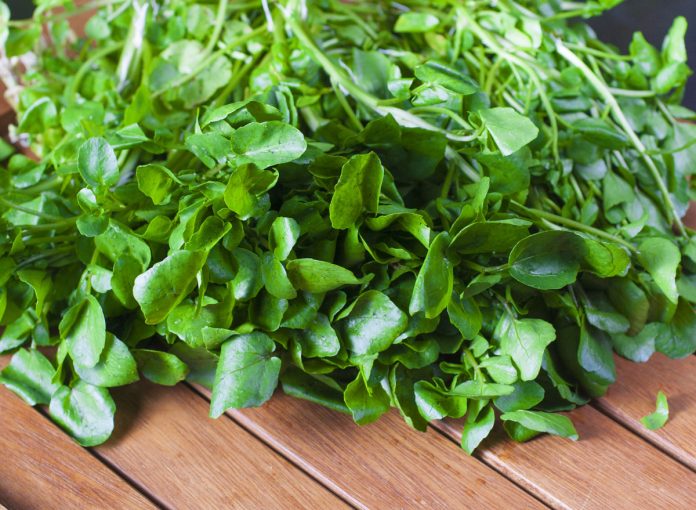The 10 Benefits of Watercress’ Watercress is a nutrient-rich green leafy vegetable that has been eaten for centuries for its health benefits. It is a good source of vitamins A, C, and K, as well as minerals like manganese, potassium, and folate. Here are 10 of the health benefits of watercress:
Watercress is the superfood vegetable on everyone’s mind these days, and that’s because it was dubbed the “healthiest vegetable in the world” by the Centers for Disease Control (CDC). Granted, it was back in June 2014 when watercress topped the list of a report called “Defining Powerhouse Fruits and Vegetables: A Nutrient Density Approach,” but the news has resurfaced over the last few weeks, spurred by what looks to be one very successful marketing campaign by B&W Quality Growers. The produce manufacturer used the 2014 CDC scoring as a way to get more people to start buying watercress, and everyone from Vogue to the New York Post subsequently covered the leafy green‘s benefits. Now, we can perhaps thank this strange game of reporting telephone for drudging up old news and reminding us just how nutrient-dense and beneficial watercress can be.
READ POST: 5 Healthy Daily Habits for Women To Counteract Aging’s Effects

The 10 Benefits of Watercress
-
Packed with nutrients. Watercress is a nutrient powerhouse, providing a wide range of vitamins and minerals that are essential for good health. One cup (34 grams) of watercress provides:
- 24% of the Daily Value (DV) for vitamin C
- 106% of the DV for vitamin K
- 22% of the DV for vitamin A
- 4% of the DV for calcium
- 4% of the DV for manganese
- 2% of the DV for iron
-
High in antioxidants. Watercress is a good source of antioxidants, which can help protect cells from damage caused by free radicals. Free radicals are unstable molecules that can damage cells and contribute to the development of chronic diseases such as cancer, heart disease, and stroke.
-
May help prevent cancer. Some studies have shown that watercress may help prevent certain types of cancer, such as colon cancer, prostate cancer, and breast cancer. The antioxidants in watercress may help protect cells from damage caused by free radicals, which can contribute to the development of cancer.
-
May improve heart health. Watercress contains compounds that may help improve heart health. For example, watercress contains nitrates, which can help widen blood vessels and improve blood flow. This can help lower blood pressure and reduce the risk of heart disease.
-
May boost the immune system. Watercress is a good source of vitamin C, which is essential for a healthy immune system. Vitamin C helps the body fight off infection and disease.
-
May help with weight loss. Watercress is low in calories and high in fiber, making it a good food for people who are trying to lose weight. Fiber helps you feel full, so you may eat less overall.
-
May improve eye health. Watercress contains carotenoids, which are antioxidants that may help protect the eyes from damage. Carotenoids can help reduce the risk of age-related macular degeneration (AMD), a leading cause of blindness in older adults.
-
May help improve skin health. Watercress contains vitamin C, which is essential for collagen production. Collagen is a protein that gives skin its strength and elasticity. Eating enough vitamin C may help reduce the appearance of wrinkles and keep skin looking young and healthy.
-
May help reduce inflammation. Watercress contains compounds that may help reduce inflammation. Inflammation is a major risk factor for many chronic diseases, such as heart disease, stroke, and cancer.
-
Easy to add to your diet. Watercress is a versatile vegetable that can be added to many different dishes. It can be eaten raw in salads, sandwiches, and wraps. It can also be cooked like spinach or kale.
Overall, watercress is a nutrient-rich vegetable that has many potential health benefits. It is a good choice for people who are looking for a healthy and delicious way to improve their diet.
ALSO READ: 7 Exercises You Must Try for a Slimmer Core in 30 Days
Sources

